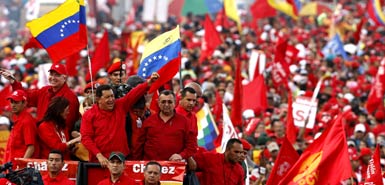Venezuela: At a Crossroads

While Venezuela prepares for another Constitutional referendum, the country is in turmoil.
Back in December 2007 Hugo Chavez held a referendum to change the Venezuelan constitution. The 69 amendments would have ended presidential term limits and centralized Chavez’s power, even when he already controlled the National Assembly, the Supreme Court, almost every state government and the entire federal bureaucracy. The changes were rejected by 51% of the voters. However, Chavez didn’t give up on his power consolidation goal. Last year he enacted 26 new laws by announcing initially only their title, not their content, and continued to push for ending presidential term limits. This Sunday, the country votes again on term limits.
In the period since the 2007 referendum, Chavez has continued to nationalize the private sector, including food production and distribution, steelmaking, cement companies, and the Banco de Venezuela. Oil revenues are mismanaged: A computer belonging to FARC members proved that Chavez had sent hundreds of millions of oil dollars to the Colombian terrorists, with which he had made common cause. The oil industry, on which the Venezuelan economy is more dependent now than when Chavez first took office, is behind on billions of dollars in payments to private oil contractors from Oklahoma to Belarus.
The business environment has been rated by The Economist as the world’s second-worst. The country’s official inflation rate of 31% is the highest out of the 82 world currencies tracked by Bloomberg.
During his years in office Chavez has forged increasingly strong ties with Iran. Last December Italian newspaper La Stampa (link in Italian) reported that Iran is going through Venezuela to dodge UN sanctions and use Venezuelan aircraft to ship missile parts to Syria. La Stampa reported that Venezuelan airline Conviasa transports computers and engine components from the Iranian industrial group Shahid Bagheri, which is involved in Iran's ballistic missile program. Iran Air initiated direct air service between Tehran, Damascus and Caracas at Chavez’s invitation. Western anti-terrorism officials are concerned that Hezbollah may be using Venezuela as a base for operations. Hezbollah activities may include kidnappings, extortion and drug trade.
Internally, the political opposition has few resources and no unified leadership (link in Spanish). Student demonstrators have been tear-gassed and fired at with rubber bullets by police. Chavez banned Lech Walesa from visiting the country and meeting with student leaders on Thursday. However, the opposition managed a large demonstration against the constitutional amendment last weekend, and met on Friday with EU delegates who are in Venezuela to observe the electoral process even when the delegates have not been granted official observer status.
The government’s propaganda for a YES vote is constant and everywhere as the referendum nears.



